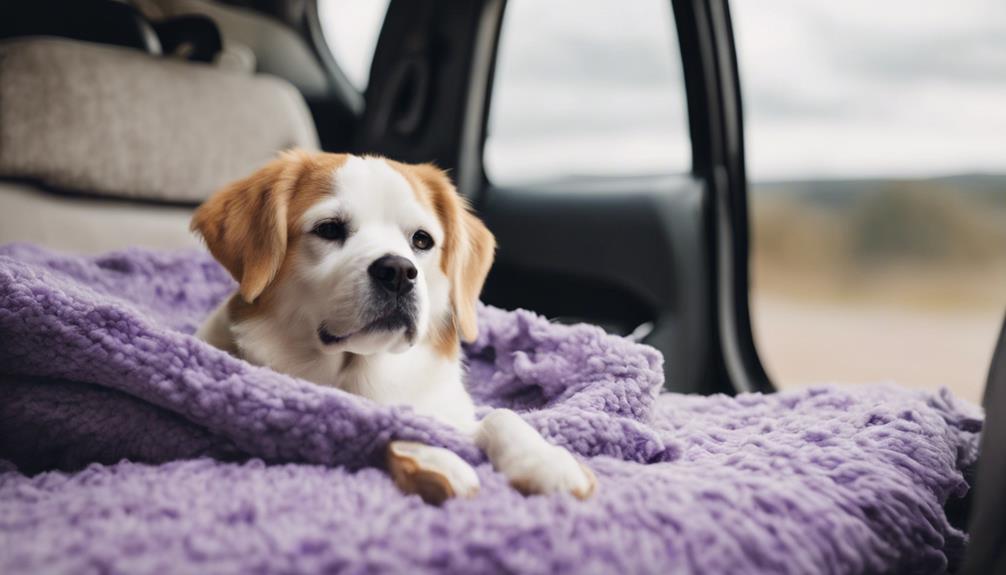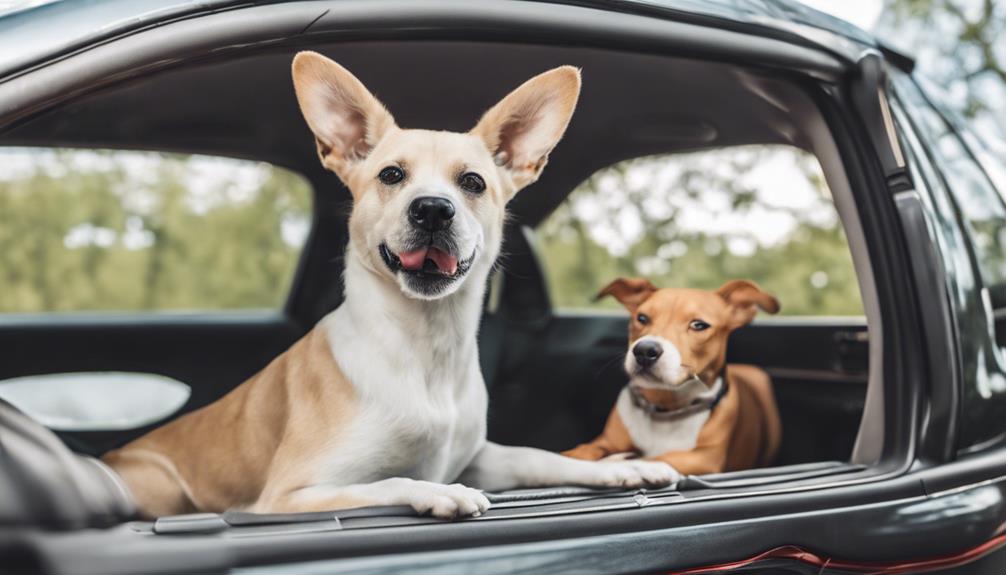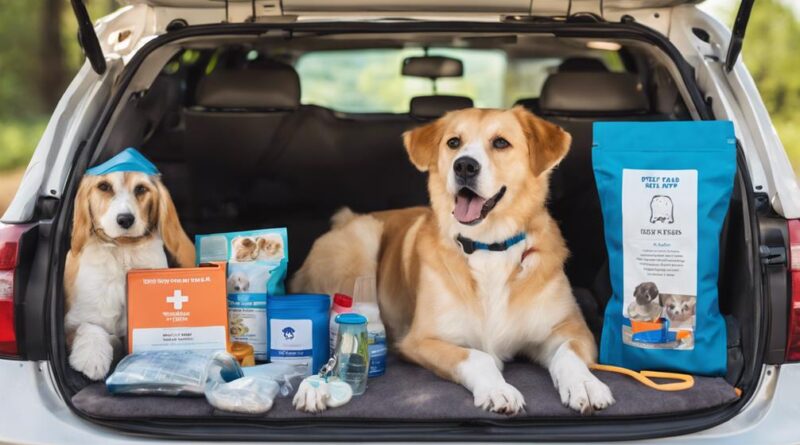Top 10 Tips: Keeping Pets Healthy on Road Trips
Embark on a healthy road trip with your pet by prioritizing pet-friendly accommodations. Keep them hydrated with regular water breaks and nutritious snacks. Plan consistent potty stops and have a pet first aid kit handy. Secure your pet with restraints or crates for safety. Ensure comfort by sticking to routines and providing mental stimulation. Incorporate exercise and playtime for their well-being. Maintain proper ventilation in the vehicle. Remember to schedule a vet check-up before the trip for peace of mind. Your furry friend's health is key for a fun journey ahead.
Pet-Friendly Accommodations
When planning a road trip with your furry companion, ensuring you have pet-friendly accommodations booked in advance is crucial for a smooth and enjoyable journey. You'll want to look for accommodation options that not only welcome pets but also provide the necessary pet amenities to keep your four-legged friend comfortable and happy throughout your trip.
Before hitting the road, take the time to research pet-friendly hotels, motels, or vacation rentals along your route. Many establishments offer pet amenities such as designated pet areas, pet beds, food and water dishes, and even pet-sitting services. When booking your accommodations, make sure to inquire about these amenities to ensure your pet will have everything they need during your stay.
Some accommodation options go above and beyond by offering pet-friendly perks like welcome treats, pet grooming services, and even pet daycare facilities. These extras can make a big difference in your pet's travel experience, helping them feel at ease in a new environment.
Remember to check the pet policies and any additional fees that may apply when booking pet-friendly accommodations. By planning ahead and choosing the right pet-friendly places to stay, you can make your road trip a stress-free and enjoyable adventure for both you and your furry companion.
Hydration Is Key
Staying properly hydrated is essential for keeping your pet healthy and happy during road trips. Here are some tips to ensure your furry friend stays hydrated throughout the journey:
- Water Stations: Plan your route with stops at pet-friendly locations that offer water stations. These pit stops will allow your pet to drink fresh water and stay hydrated.
- Portable Bowls: Invest in a collapsible or portable water bowl. These travel-friendly bowls are convenient for providing water to your pet whenever they need it. Remember to offer water regularly, especially on hot days.
- Keep Water Handy: Pack enough water for your pet's needs. Having a supply of water in the car ensures you can offer your pet a drink even if you don't come across any water stations.
- Monitor Hydration: Watch out for signs of dehydration such as dry gums, lethargy, or sunken eyes. If you notice any of these signs, stop and offer your pet water immediately.
Regular Potty Breaks
To ensure your pet remains comfortable and content during your road trip, it's crucial to schedule regular potty breaks along your journey. Travel anxiety can affect pets just like it affects humans. Changes in routine, unfamiliar surroundings, and the motion of the vehicle can all contribute to your pet feeling anxious. Providing your pet with consistent potty breaks can help alleviate some of this anxiety by allowing them to stretch their legs, explore new scents, and relieve themselves.
When planning your road trip, research rest stop accommodations along your route. Look for pet-friendly rest areas or parks where your furry friend can take a break from the car. These stops not only provide opportunities for your pet to go to the bathroom but also allow them to get some exercise and mental stimulation. Remember to keep your pet on a leash during these stops for their safety.
Pack Pet First Aid Kit
Pack a pet first aid kit with essential supplies to ensure you're prepared for any health emergencies that may arise during your road trip. It's crucial to have the necessary items on hand to address any unexpected situations that might occur with your furry companion.
Here are some key items to include in your pet first aid kit:
- Emergency supplies: Stock up on items like gauze pads, adhesive tape, antiseptic wipes, and tweezers. These essentials can help you handle minor injuries or wounds your pet may encounter while on the road.
- Travel safety: Include items such as a pet-safe disinfectant, instant cold pack, and a pet thermometer. These items can assist you in maintaining your pet's health and comfort during the journey.
- Medications: Bring along any necessary medications your pet may require, along with a copy of their prescriptions. It's important to stay on top of your pet's medication schedule, especially during a road trip.
- Contact information: Have a list of emergency contacts, including your regular veterinarian and the nearest animal hospital along your route. In case of a health emergency, having these contacts readily available can save valuable time and stress.
Secure Your Pet
Ensuring your pet's safety while traveling is paramount to a stress-free and enjoyable road trip experience. When hitting the road with your furry companion, it's crucial to secure them properly. One of the best ways to do this is by using a car restraint or a travel crate.
Car restraints are designed to keep your pet safe and secure while inside the vehicle. They come in various styles such as seat belt harnesses, pet seat belts, and pet car seats. These restraints prevent your pet from roaming around the car, which can be distracting and dangerous while driving. Additionally, in case of any sudden stops or accidents, a car restraint can protect your pet from getting injured.
Travel crates are another excellent option for securing your pet during road trips. Crates provide a confined and safe space for your pet to travel in. Make sure the crate is well-ventilated, large enough for your pet to stand, sit, lie down comfortably, and secure it in place to prevent it from sliding around during the journey.
Before your trip, introduce your pet to the car restraint or travel crate to help them acclimate. Remember, the goal is to keep your pet safe and secure throughout the journey so that both you and your furry friend can have a fantastic road trip experience.
Healthy Snacks on Hand
Having nutritious snacks readily available is essential for keeping your pet healthy and satisfied during road trips. Here are some tips to ensure you have the right snacks on hand:
- Nutritious Treats: Opt for treats that aren't only tasty but also provide nutritional benefits. Look for options with high protein content and natural ingredients to keep your pet energized throughout the journey.
- Portable Water: Hydration is key, so make sure to pack enough water for your pet. Consider investing in a portable water bottle or a travel bowl to make it easier for your pet to drink while on the road.
- Healthy Fruits and Vegetables: Pack some pet-friendly fruits and veggies like apple slices, carrots, or blueberries. These can serve as healthy snacks that add variety to your pet's diet.
- Avoid Junk Food: While it may be tempting to give your pet a taste of your fast food on the go, it's best to stick to their regular diet. Junk food can upset their stomach and lead to unnecessary health issues during the trip.
Mind Pet's Comfort

To ensure your pet's comfort during road trips, prioritize their familiar routines and surroundings to help them feel secure and at ease in the new environment. Pets can experience stress during travel, so it's crucial to manage this by maintaining consistency wherever possible. Bring along their favorite blanket or toy to provide a sense of familiarity. Additionally, try to stick to their regular feeding and walking schedule as closely as you can.
When planning your road trip, factor in regular rest stops for both you and your pet. These breaks are essential for your pet to stretch their legs, go to the bathroom, and have a drink of water. Use these rest stops as opportunities to check in on your pet's well-being and ensure they're comfortable with the journey.
If your pet shows signs of stress, such as excessive panting or whining, consider incorporating calming techniques like playing soothing music or using a pheromone spray designed to reduce anxiety. Remember to reassure your pet with gentle words and petting to help them relax.
Exercise and Playtime
During your road trip with your pet, make sure to incorporate regular exercise and playtime to keep them happy and healthy while on the go. It's essential to provide opportunities for your furry companion to stretch their legs and engage in activities that stimulate their minds.
Here are some tips to help you incorporate exercise and playtime into your road trip routine:
- Take Breaks for Outdoor Activities: Plan stops at pet-friendly parks or rest areas where your pet can run around, sniff new scents, and explore the surroundings. This won't only provide physical exercise but also mental stimulation.
- Pack Interactive Toys: Bring along toys that your pet can play with during rest stops or in the hotel room. Interactive toys can challenge your pet's problem-solving skills and keep them entertained.
- Engage in Training Sessions: Use road trip breaks as an opportunity to practice obedience training or teach your pet new tricks. Training sessions are mentally stimulating and can strengthen the bond between you and your pet.
- Rotate Activities: Keep your pet engaged by switching up the activities. For example, if you went for a long walk in the morning, opt for a shorter walk but incorporate some playtime in the afternoon.
Proper Ventilation

Ensure your pet has access to proper ventilation throughout your road trip to maintain their comfort and well-being. Adequate air circulation is crucial to keep your furry friend cool and relaxed during the journey. Make sure that your vehicle's ventilation system is functioning correctly to provide a constant flow of fresh air. If your pet is in a carrier, ensure there are ventilation holes or openings to allow for proper airflow.
Temperature control is also essential when it comes to ventilation. Avoid exposing your pet to extreme temperatures inside the vehicle. On hot days, use air conditioning or crack open the windows slightly to prevent overheating. Conversely, on colder days, keep the vehicle warm and cozy for your pet. Remember that pets are sensitive to temperature changes, so it's crucial to maintain a comfortable environment for them throughout the trip.
Monitor your pet for any signs of discomfort, such as heavy panting or lethargy, which could indicate poor ventilation or temperature regulation. Be attentive to their needs and adjust the ventilation accordingly. By ensuring proper air circulation and temperature control, you can help your pet stay healthy and happy during your road trip.
Vet Check-Up Before Trip
If your furry companion is due for their regular check-up, scheduling a vet appointment before your road trip is a wise and caring step to ensure their well-being on the journey. Here are some reasons why a vet check-up before your trip is essential:
- Pre-Trip Vaccinations: Make sure your pet's vaccinations are up to date before traveling. This will help protect them from common diseases they may encounter on the road.
- Health Assessment: A vet check-up allows the veterinarian to assess your pet's overall health and address any concerns before embarking on a trip. It's better to catch any issues early on.
- Medication Refills: If your pet requires any medications, a pre-trip vet visit ensures you have an ample supply for the journey. Don't forget to pack any necessary medications for your pet.
- Managing Travel Anxiety: If your pet experiences travel anxiety, the vet can provide recommendations or prescribe medications to help keep them calm during the trip. This can make the journey more pleasant for both you and your pet.
Taking the time to visit the vet before your road trip demonstrates your commitment to your pet's health and well-being. It's a proactive step that can help ensure a safe and enjoyable adventure for both you and your furry friend.
Frequently Asked Questions
Are There Any Specific Rules on Bringing Pets to Tourist Attractions?
When it comes to bringing pets to tourist attractions, it's important to check for pet-friendly policies and any restrictions in place. Some attractions may have rules about where pets are allowed or if they need to be on a leash.
Being aware of these guidelines can help ensure a smooth visit for you and your furry friend. Consider researching ahead of time to make the most of your experience while keeping your pet safe and happy.
How Can I Help My Pet Cope With Motion Sickness During Travel?
To help your pet cope with motion sickness during travel, try natural remedies like ginger or chamomile.
Behavioral training can also desensitize them to movement.
Ensure they have a comfortable seating arrangement and consider using travel gadgets like pet seat belts or carriers.
Start with short rides to help them adjust. Gradually increase the duration to build tolerance.
What Should I Do if My Pet Gets Anxious in New Environments?
When your pet feels anxious in new environments, focus on anxiety management through pet training. Start by slowly introducing them to different places to build confidence. Use positive reinforcement to reward calm behavior.
Gradually increase exposure to new environments to help your pet adapt. Consistency and patience are key in helping your furry friend feel more comfortable and secure in unfamiliar surroundings. With time and practice, your pet's anxiety in new environments can improve significantly.
Is There a Recommended Way to Introduce My Pet to a New Hotel Room?
When introducing your pet to a new hotel room, take it slow. Let them sniff around and get comfortable with the space.
Check for pet-friendly amenities like designated areas for pets or nearby pet-friendly parks.
Encourage room exploration, but keep an eye on them to ensure they don't get into anything harmful.
Offer familiar items like their bed or toys to help them feel more at ease in the new environment.
How Do I Ensure My Pet's Safety in Case of an Emergency on the Road?
To ensure your pet's safety in case of an emergency on the road, it's vital to have pet emergency preparedness plans in place.
Research roadside assistance for pets or add it to your existing coverage.
Keep a pet first aid kit handy and have important documents like vaccination records easily accessible.
Consider microchipping your pet for added security.
Stay calm and focused to handle any unexpected situations effectively.
Conclusion
Remember, keeping your pet healthy on road trips is all about preparation and care. By following these top 10 tips, you can ensure that your furry companion stays happy and healthy while traveling with you.
From finding pet-friendly accommodations to packing a pet first aid kit and scheduling regular vet check-ups, these simple steps can make a big difference in your pet's well-being on the road.
Safe travels!
